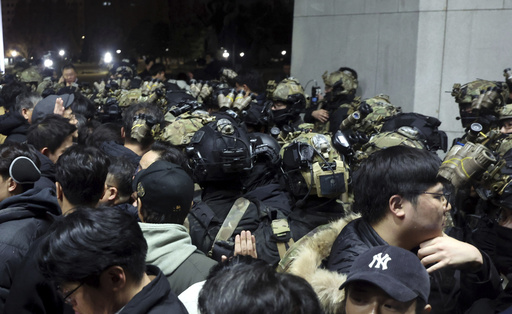
TOKYO — In a shocking turn of events, the South Korean parliament found itself surrounded by troops in the early hours of Wednesday following President Yoon Suk Yeol’s declaration of martial law. The president accused elements within the opposition of conspiring to overthrow what is recognized as one of the world’s most dynamic democracies. This unexpected move incited immediate outrage among lawmakers, prompting a hasty vote to nullify the declaration during a pre-dawn session.
The dramatic announcement of martial law marks the first of its kind in South Korea since the 1980s when the nation was under a dictatorship. Confusion and panic engulfed the country as Yoon’s decree sent shockwaves through the populace, especially considering its historical context. The declaration came at a time when Yoon’s administration has been marred by political stalemate and personal controversies involving both him and his wife.
Despite the lack of concrete evidence, Yoon pointed to North Korea as a destabilizing influence, arguing for a hardline stance toward Pyongyang to prevent potential nuclear threats against Seoul. The military acted swiftly, setting up barricades and mobilizing troops to parliament as rumors swirled. The opposition, which holds sway in parliament, was summoned back to the building where they ultimately voted to revoke the martial law declaration amidst escalating tensions.
The president’s assertions of an “anti-state” conspiracy lacked specificity, provoking further questions among the populace. His claims suggested that the opposition was involved in “anti-state activities plotting rebellion,” yet he failed to provide clarifying details or substantial proof. This vague rhetoric has drawn comparisons to the oppressive tactics used by past dictatorships in South Korea, which frequently invoked the North as justification for cracking down on dissent.
Yoon’s declaration faced vehement criticism from both opposition figures and members of his own conservative party. Lee Jae-myung, the opposition leader who narrowly lost the 2022 presidential election to Yoon, labeled the move “illegal and unconstitutional.” Simultaneously, Han Dong-hoon, head of Yoon’s conservative faction, condemned the decision as “wrong” and pledged to mobilize public resistance. Widespread disbelief and concern erupted on social media, as citizens shared their shock at the announcement.
The political landscape leading to this tumultuous event has not been favorable for Yoon, with his approval ratings plummeting and a host of policy initiatives stalling in an opposition-controlled parliament. Conservatives allege that the opposition’s actions are motivated by political vendettas linked to investigations into Lee Jae-myung, who is seen as a frontrunner for the next presidential election in 2027. Yoon is grappling with allegations related to an influence-peddling scandal that has further damaged his standing among the public.
The sensitive history surrounding martial law in South Korea looms large, given that the nation only transitioned to democracy in the late 1980s. Past military interventions during the rebuilding period post-Korean War involved leaders declaring martial law to suppress anti-government protests ruthlessly. For many citizens today, the images of military forces on the streets invoking martial law conjure a painful and contentious past.
Historical references to martial law recall the rule of dictators like Park Chung-hee, who gained power through a coup in 1961, deploying soldiers and tanks to quash dissent. Following Park’s assassination, Chun Doo-hwan staged another coup in 1979 and is remembered for his violent suppression of pro-democracy protests, including the tragic Gwangju uprising that left hundreds dead. The remarkable transformation toward democratic governance was culminated in 1987 when mass protests led to the acceptance of direct presidential elections.
The current political climate reflects South Korea’s complex struggle with its recent past, as citizens remain vigilant against the potential resurgence of authoritarian measures. As this situation continues to unfold, the implications of Yoon’s controversial decision may reshape the political narrative in the years to come. The people’s reaction and the legislative response will be crucial in determining the path forward for democracy in South Korea.
